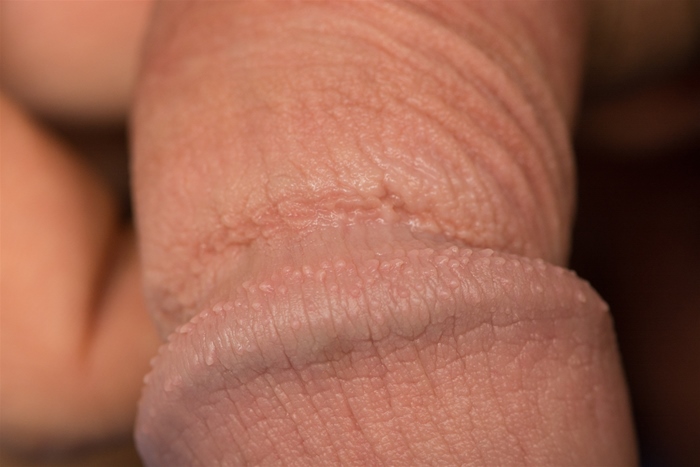A 20-year-old man comes to the office due to penile lesions, which began several months ago. The lesions have not enlarged, and the patient has had no fever, pain, discomfort, dysuria, or urethral discharge. He says, "These spots appeared after I had unprotected sex with a woman I met at a party. I am worried that I may have a sexually transmitted disease." The patient has not had sexual intercourse since then but masturbates regularly. He has no medical problems, takes no medications, and does not use tobacco, alcohol, or illicit drugs. The patient is a college student and works part time as a restaurant server. Vital signs are within normal limits. No lymphadenopathy or other skin rashes are present. External genitalia examination findings are shown below.  Which of the following is the most appropriate next step in management of this patient's current condition?
Which of the following is the most appropriate next step in management of this patient's current condition?
A) Advise low-potency topical corticosteroid
B) Perform shave biopsy of the lesions
C) Prescribe oral acyclovir therapy
D) Prescribe topical imiquimod
E) Reassure that it is a normal variant
Correct Answer:
Verified
Q339: A 28-year-old man comes to the office
Q340: A 5-year-old boy is brought to the
Q341: A 5-year-old boy is brought to the
Q342: A 7-year-old girl is brought to the
Q343: A 32-year-old woman comes to the emergency
Q345: A 3-year-old boy is brought to the
Q346: A 62-year-old man is brought to the
Q347: A 57-year-old woman comes to the physician
Q348: A 65-year-old man was admitted to the
Q349: A research group is studying a new
Unlock this Answer For Free Now!
View this answer and more for free by performing one of the following actions

Scan the QR code to install the App and get 2 free unlocks

Unlock quizzes for free by uploading documents